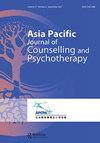The effects of therapists’ attractiveness and attributes on clients’ inclination toward self-disclosure – to wear makeup or not to wear makeup?
IF 0.5
4区 心理学
Q4 PSYCHOLOGY, CLINICAL
Asia Pacific Journal of Counselling and Psychotherapy
Pub Date : 2022-01-02
DOI:10.1080/21507686.2022.2036209
引用次数: 0
Abstract
ABSTRACT Previous research suggests that more attractive therapists can encourage clients to disclose themselves more. On account of the halo effect, it can be conjectured that this relationship is mediated by other perceived attributes of therapists, such as their counselling competence and empathic understanding. Nonetheless, no study has been undertaken to examine this mediation effect. This study was therefore geared towards testing the indirect effect of therapists’ physical attractiveness on clients’ inclination towards self-disclosure via therapists’ core attributes. In addition, the application of cosmetic makeup, therapist age, and client sex were considered. A total of 129 young adults were recruited to complete the Therapist Attribute Inventory and Jourard Self-Disclosure Questionnaire based on one of the four photographs of female therapists with or without wearing makeup. The data was analysed using 7 PROCESS Macro models. The results indicate that positive ratings on perceived therapist attractiveness can be transferred to other therapist attributes, which in turn promote clients’ inclination towards self-disclosure. The application of cosmetics has an impact on this mediation effect, albeit being in an unexpected fashion. This has implications for whether therapists should wear makeup in a Hong Kong Chinese counselling setting and how it would affect clients’ self-disclosure.治疗师的吸引力和属性对来访者自我表露倾向的影响——化妆或不化妆?
先前的研究表明,更具吸引力的治疗师可以鼓励来访者更多地透露自己。由于光环效应,可以推测这种关系是由治疗师的其他感知属性介导的,例如他们的咨询能力和共情理解。然而,目前还没有研究对这种中介效应进行检验。因此,本研究旨在通过治疗师的核心属性来测试治疗师的外表吸引力对来访者自我披露倾向的间接影响。此外,化妆品的应用、治疗师的年龄和客户的性别也被考虑在内。共招募了129名年轻成人,根据四张女性治疗师化妆或不化妆的照片中的一张,完成了治疗师属性量表和日记自我披露问卷。使用7个PROCESS Macro模型对数据进行分析。结果表明,对治疗师吸引力的正面评价可以转移到治疗师的其他属性上,进而促进来访者自我表露的倾向。化妆品的应用对这种中介效应有影响,尽管是以一种意想不到的方式。这对香港华人咨询机构的治疗师是否应该化妆,以及这将如何影响客户的自我表露产生了影响。
本文章由计算机程序翻译,如有差异,请以英文原文为准。
求助全文
约1分钟内获得全文
求助全文

 求助内容:
求助内容: 应助结果提醒方式:
应助结果提醒方式:


